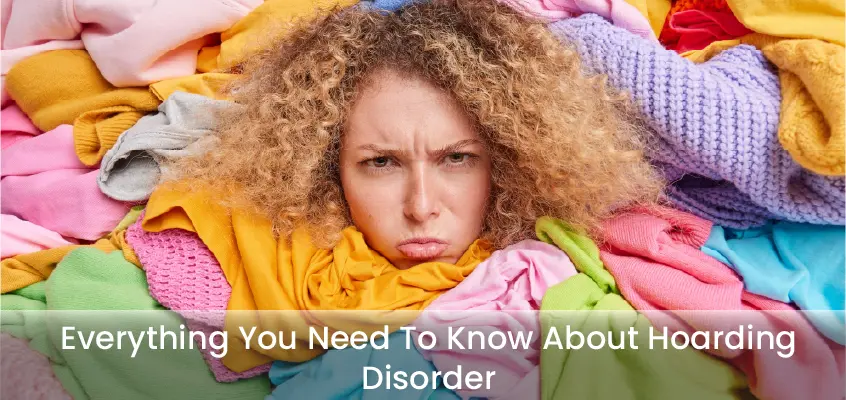Introduction
Hoarding disorder is a condition often portrayed by the media as a quirky eccentricity. But the reality is that it can be a sign of a mental health condition with severe consequences. Read on to learn more about hoarding disorder, its causes, symptoms, and available treatment methods.
What is hoarding disorder?
The tendency to find it difficult to discard or part with possessions regardless of their value is a classic characteristic of the hoarding disorder. People with hoarding disorder may accumulate excessive objects even if they cannot use or store them.
The exact cause of hoarding disorder is not yet known, but a combination of psychological, emotional and social factors may cause it. People with hoarding disorder may have trouble making decisions. They will also be attached to their belongings and may feel anxiety or fear about letting go of things.
Hoarding disorder is different from being messy. People with hoarding disorder often have intense emotional attachments to their belongings and experience great distress at getting rid of them. For many, accumulating belongings is a way to cope with anxiety or trauma.
Hoarding disorder can have a significant impact on an individual’s life, and it can lead to problems with cleanliness, finances, and social life.
Symptoms of hoarding disorder
The symptoms of hoarding disorder can differ from person to person, depending upon the severity of the condition. The most common symptoms of this disorder include:
- Excessive acquisition of items, even if they’re of no use or value
- Inability to throw away or donate possessions even if they’re causing a mess
- Cluttered living spaces to the point where it’s challenging to move around
- Hoarded items take over essential areas of the home, such as the kitchen or bathroom
- Neglecting basic needs such as eating, bathing or sleeping due to hoarding-related compulsions
- Not trusting others to touch their possessions
- Significant emotional distress over the prospect of getting rid of hoarded items
- Social isolation and withdrawal due to embarrassment over the state of the home
- Difficulty organising or categorising possessions
- Extreme difficulty making decisions.
If someone you know exhibits these symptoms, it may be time to seek professional help. Hoarding disorder can be challenging to overcome, but with the proper treatment and support, recovery is possible.
Causes of hoarding disorder
The idea of being surrounded by many items is comforting for some people. But for others, it can be overwhelming and even traumatic. Many factors can contribute to hoarding disorder, including genetics, brain chemistry, buying habits and psychological factors. Here are some common causes of hoarding disorder:
- Genetic factors
Hoarding disorder often runs in families, and there may be a genetic component.
- Psychological factors
People with hoarding disorder may have differences in how they process information and make decisions. Furthermore, mental health illnesses such as obsessive-compulsive disorder (OCD) and attention-deficit hyperactivity disorder (ADHD) are associated with this disorder.
- Environmental factors
Early life experiences such as trauma or the loss of a loved one can contribute to the development of hoarding disorder. Hoarding may be used as a coping mechanism for people who have experienced trauma or loss in their lives.
Whatever the cause of this condition, it is essential to understand that treatment options are available to help you deal with it.
Treatment of hoarding disorder
People with hoarding disorder often struggle to part with their belongings, even if they are useless or hazardous. The condition can make everyday life difficult and dangerous in some cases. While there is no cure for hoarding disorder, treatment options can help manage the situation.
Therapy
Cognitive behavioural therapy (CBT) is one common treatment approach for hoarding disorder. This type of therapy can help you change your thinking and behaviour patterns. CBT may involve learning to organise and declutter belongings and facing fears about letting go of objects.
Medication
In some cases, medical practitioners prescribe medication to help manage the disorder. For example, antidepressants may treat associated anxiety or depression, and antipsychotic drugs may treat delusions or obsessive thoughts.
In cases where the condition is not severe and not causing significant problems in daily life, self-help and support groups may be enough. For example, you can try meditating to stop obsessing about your belongings.
Conclusion
Hoarding disorder is a mental disorder characterised by the excessive accumulation of items, even if those items are of no real value. People with hoarding disorder may need to keep objects for emotional reasons. Hoarding can cause significant problems in your life, including relationship difficulties, financial issues, and even the loss of a place to live. The exact cause of hoarding disorder is not yet known, but understanding the potential contributing factors can help to develop more effective treatments for this condition.
If someone you know is struggling with hoarding disorder, help is available. Treatment for hoarding disorder often includes therapy and medication. With treatment, individuals with this disorder can learn to manage their condition and live happier healthier lives.
References:
https://my.clevelandclinic.org/health/diseases/17682-hoarding-disorder
https://www.mind.org.uk/information-support/types-of-mental-health-problems/hoarding/causes-of-hoarding/
https://www.mayoclinic.org/diseases-conditions/hoarding-disorder/symptoms-causes/syc-20356056









